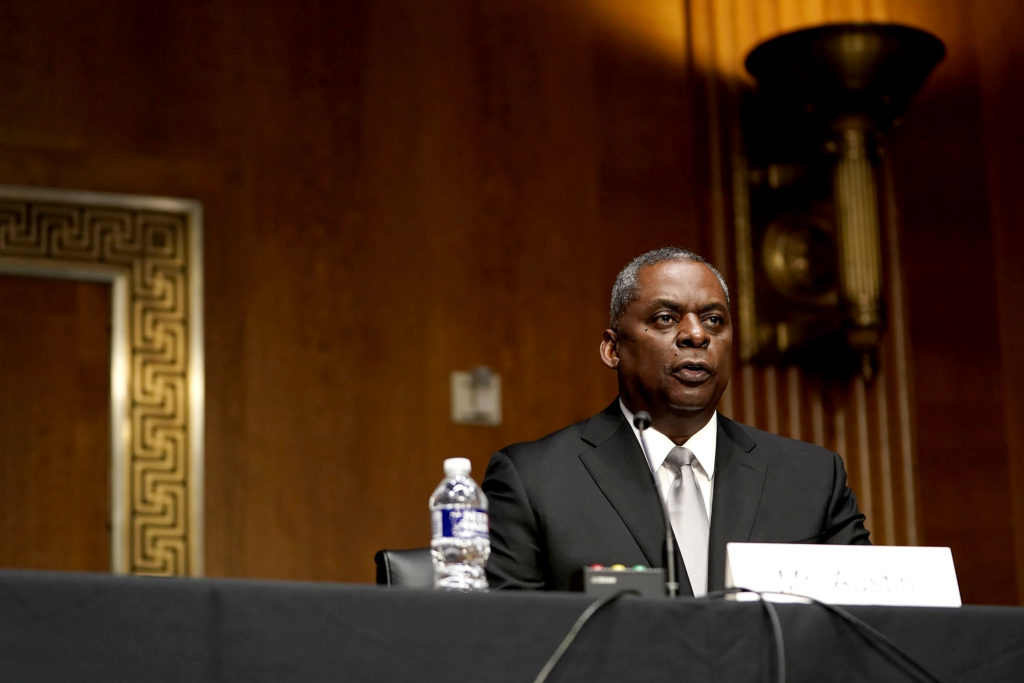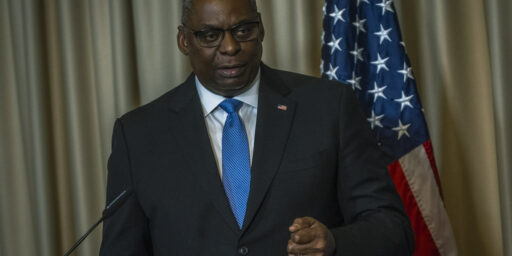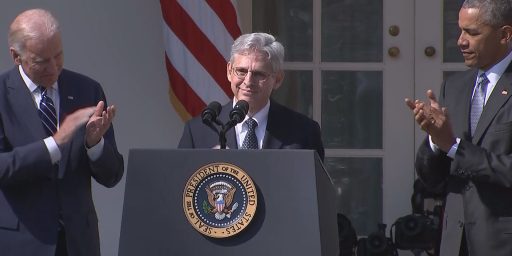Lloyd Austin Confirmed as SECDEF
History has been made in more than one way.

As predicted, recently-retired General Lloyd Austin has been granted a “waiver” allowing him to serve as Secretary of Defense.
YahooNews (“Senate Confirms Lloyd Austin To Be The First Black Defense Secretary“):
Lawmakers in the House and Senate approved Lloyd Austin as the new defense secretary, giving the Pentagon its first Black secretary and ending weeks of debate over President Joe Biden’s choice of a former Army general for a job nearly always held by a civilian.
After each chamber on Thursday approved a waiver that allowed Austin to take the job just a few years after leaving active military service, the Senate confirmed him Friday morning in a 93-2 vote.
I put “waiver” above in scare quotes because, while it has routinely been called that in the press, it’s actually beyond that. There is no provision in the law for waiving the requirement that a nominee be at least seven years separated from active service. Austin, like Jim Mattis in 2016 and George Marshall in 1950 required a private bill exempting them from the law.
Still, while I have expressed my concern about normalizing this practice, I was well aware that it was unlikely that Congress would refuse to allow Austin to serve. Not only is he otherwise well-qualified to serve but voting against a well-qualified Black man at this point in time would have been politically challenging.
Further, Bishop Garrison makes a strong point in his essay “Representation at the Top: The Importance of Race in the Austin Nomination Debate.”
[T]he pushback against Austin’s nomination has left little room to celebrate what is also a milestone for Black Americans in and out of uniform. As the New York Times notes, “The military is one of the most diverse institutions in the country, but its senior leadership (as in many other American institutions) is virtually all white.”
Throughout his military career, Austin has been a trailblazer, reaching positions previously closed to Black soldiers. He was the first Black commander to lead a Corps in combat, the first Black commander of an entire theater of war, and the first Black commander of U.S. Central Command, responsible for the Middle East, Central and South Asia. If confirmed by the Senate, he’ll once again break down barriers that should never have been in place. As another colleague and friend, Meg Guilford, mentioned on Twitter about Austin’s selection, “Watching the President-elect formally nominate Lloyd Austin, III as his Secretary of Defense was pretty emotional for me. I never thought I would see a Black person nominated to be the Secretary of Defense. Working for DoD, I never had a Black boss & rarely had Black co-workers.”
And here’s the thing: If we acknowledge the symbolic value of having a Black leader in this post, we must also understand that the pool we can draw from is small, indeed.
There will soon only be two Black senators in Congress. Diverse leadership in the senior ranks of the intelligence community continues to be a major issue. In the private sector, Fortune 500 CEO diversity remains incredibly low. For instance, there are currently only five Black chief executives accounting for approximately one percent of the total. There are currently no Black governors and only four in the country that identify as a minority. Austin is a historic leader because he has often been the first to blaze the trail.
So, while I continue to have reservations on the civil-military relations front, this is a historic moment.





1948 Eisenhower signed an Executive Order integrating the Military. Today, a Black Man was appointed head of the entire DOD. This day, at least for me, is 2nd only to Obama being elected President in terms of the tremendous pride I feel. Salute!
@Jim Brown 32: Truman.
@gVOR08: Thanks! I saw that after I clicked post but no @#$% edit button!
While it is historic, there is still too little discussion of Austin’s views or how he intends to run the Department. I hope that signals that DoD will become more of a supporting element and not the lead department for US foreign policy.
@Andy: Thats really not a choice he or any other SECDEF gets to make. Biden will decide if he wants to acquiesce his foreign policy to the Cabinet level and whether State or DOD will lead if he divests.
Bush and Obama ran most everything out of the White House. Trump divested alot of decision-making making to State and DOD. I personally think we have a good division of decision-making at the correct levels and Biden should run with status quo here.
The only real question is how Biden wants to tackle the Russia-China threat and what he sees as DODs role in that. The pervading thought across the Department has been that there is no active role for DOD other that to field a force capable of defeating them should we ever engage them Militarily. Both Russia and China are pursuing their goals mostly non Militarily, so my feel is that Biden will have to lean on other Departments to counter them. Austin will be busy retooling the Force while managing the terrorist threat and the Iran crisis.
@Jim Brown 32:
Jim,
Thanks, and I agree – I wrote my comment poorly.
What I was trying to get at is views in terms of influence and advocacy. In the Obama administration, for example, Clinton and Gates were the hawks and their opinions seemed to carry the most weight for President Obama along with the other R2P interventionists in advisory positions. Biden famously dissented on Afghanistan and Libya policy but he was largely alone and Obama went with the hawks.
The unknown, for me at least, is what kind of advice is Austin likely to give and will he push for or against military solutions to foreign policy problems. Does he have an interventionist mindset or is he skeptical about the use of military force.
We’re moving past anti-insurgency, anti-terrorist concerns and back to big power games. A few concerns:
1) China is clearly trying to get control of the Malacca Straits, through which a great deal of shipping moves. They’re making territorial waters claims that are absurd and if they get away with it the Philippines, Malaysia and Indonesia will be in the Chinese orbit. The Chinese navy will have unfettered access to the Indian Ocean.
2) Chinese economic initiatives are making it dominant in Laos and Cambodia, a very large influence over Thailand and a threat to our old friend (Um, what?) Vietnam.
3) AGW is very favorable to the Russians who will own the arctic, its resources and a huge potential trade route. Canada doesn’t have the wherewithal to counter.
4) In the game of missile vs. aircraft carrier, I worry that we are making the wrong bet. You can buy one hell of a lot of anti-ship and ship-launched missiles for the cost of an aircraft carrier and its planes. As the range of missiles and their accuracy and countermeasures improve the safe spaces available to carriers shrinks and the air arm becomes stretched.
As noxious as the Modi regime is, we need to encourage India to deploy a serious, blue water navy. We need to have serious talks with Ottawa about the arctic. We should consider military assistance to Vietnam. We should encourage Malaysia and Indonesia to build a joint naval force. And it’s past time to get over WW2 and push the Japanese to play a bigger role.
Right now we cannot reliably defend Taiwan without going nuclear. We can still maintain free navigation through the straits, but for how much longer? We are either ceding the South China Sea and the straits, or we’re stepping back before the Chinese. We should decide.
Also, we need to position forces sufficient to crush the Kaliningrad Oblast if Putin threatens the Baltics.
My concern is that I have read too many people saying, “Good, Austin will represent the interests of the military personnel wrt policy.” My personal opinion is that’s completely backwards from how things should be. The Joint Chiefs can represent military personnel. Secretary of Defense is supposed to represent the interests of civilians wrt military policy.
@Jim Brown 32:
Austin was the first Black commander of Centcom as well.
@CSK:
I see that fact has already been noted. Where’s the edit button when you need it?
@Andy:
@Jim Brown 32:
Over the past 20 years and perhaps longer, the lead in many FP areas has been ceded to the Pentagon over the DofS, due to militaristic choices by the president. That needs to be reversed and the proper balance between the DoS and Pentagon needs to be returned. That, has been more difficult due to follies of Trump and his choices for SofS.
@Michael Reynolds:
Regarding China. Control of the South China Sea and Straits of Malacca has been effectively conceded due to China’s current strength and its geographic proximity. Through Bush and Obama, there was much dithering as to how should we engage China and then Trump gave away an effective tool by withdrawing from the TPP.
@Andy: Based on my intersection with him when he was in Command…he is pragmatic and risk adverse unless there is a tangible reward to taking a risk. I don’t expect him to be much different as SECDEF.
*And by reward I dont mean pie in the sky objectives of Democratic Peace Theory. I mean I would only see him recommending intervention for overt threats to America or our Western allies. Of course the terrorists threat is akin to mowing grass so there may be a few minor operations here or there to deal with that. But even those are going to be in cooperation with local governments and military forces.
@Michael Cain: Actually thats not the role of either. The Joint Chiefs organize, train, and equip Forces in their domain specialty. The SECDEF disburses monies appropriated by Congress and executes military operations through our Geographic Commands as directed by the President.
The concerns you raise are accounted for by the National Security Advisor and National Security Council. They look at problems from a more wholistic viewpoint to include domestic politics. In a typical Administration, DOD executes the decisions that come out of NSC and the National Security Advisors typically are closer and have more sway with POTUS than SECDEF.
@Sleeping Dog: I would add lack of confidence as well. State simply doesn’t have a reputation for delivering big victories or solving really complex problems…So POTUS will go with a lead that has resources and experience. DOD, after Iraq has acquired alot of quasi civil affairs type people.
DoS have been the lead for several large efforts and simply hasnt shown IMO they work well outside of their comfort zone of standard diplomatic coordination.
@Jim Brown 32:
Thanks for your perspective, that is good to know. I’ve heard nothing bad about Austin – which is good – but he also seems to have made a point of not making strong policy positions – which is good for a general, but potentially problematic for a cabinet secretary.
But these are mild concerns that are based on unknowns. I hope Austn does well and it is nice to see a non-traditional nominee in that role. I’m actually more bothered by Nuland getting a promotion at State and some of the more activist FP appointments.
Thanks for pointing out the dishonesty of the ‘waiver’ terminology, which implies the law envisages exemptions being granted. In my view it was a mistake to exempt Mattis from the law and it was a mistake to do it for Austin. In neither case did the administration even try to make a case justifying the exemption.
If Congress has decided the existing law has outlived its usefulness, the correct course of action is to repeal it. Simply over-riding it every time a president asks it to brings the law into disrepute. It’s yet another small step in the transfer of power from the legislature to the executive.